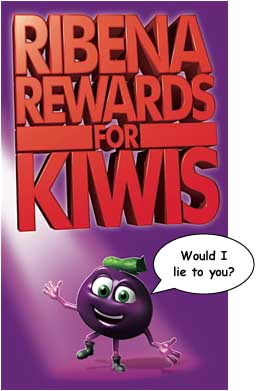
Students Anna Devathasan and Jenny Suo tested the blackcurrant cordial against rival brands to test their hypothesis that cheaper brands were less healthy. Instead, their tests found that the Ribena contained a tiny amount of vitamin C, while another brand’s orange juice drink contained almost four times more.
“We thought we were doing it wrong. We thought we must have made a mistake,” Anna told New Zealand’s Weekend Herald. The girls were both 14 and students at Pakuranga College in Auckland when they did the experiment in 2004.
When the commerce commission investigated, it found that although blackcurrants have more vitamin C than oranges, the same was not true of Ribena. It also said ready-to-drink Ribena contained no detectable level of vitamin C.
GSK is in court in Auckland today facing 15 charges relating to misleading advertising, risking fines of up to $2.16 million.
The girls should get a bounty for turning up the lies.















I’m just waiting for the company’s logo to appear with the caption “pwn3d!”
You didn’t mention in your post that this is Glaxo Smith Kline a major drug co.They knew better.
Of course they knew better. And they figured they wouldn’t get caught.
The odd thing is… Isn’t this supposed to be overseen by the FDA? Oh wait, that’s probably why we haven’t seen the product here. Flat. Out. Lies.
If you expect our government to do it’s job in this day and age you are deluded.
The government inspected it. So it must be safe!
#5, No, the government trusted the private company to report accurately and faithfully. I’m sure you remember the old neo-con adage that only private business can do the job correctly.
I bet in retaliation those two girls will end up dead.
I can’t help but wonder if Glaxo was extracting the vitamin C that should have been a natural part of the Ribena, and selling it as “Naturally-derived Vitamin C” as a separate product.
Misleading advertising? What is that never heard of anything so low;-)
I would bet if a test was done on to see what % of advertising was misleading or out and out lies, my guess would be around 90%.
Anyone want to take an over under on that.
7. You really do have a dark side to you. If you can go public big enough, the threat of corporate termination decreases.
In NZ they market it at parents as a suitable replacement for fresh fruit and as a dietary supplement for infants.
They’ll fire a worker with a year to go until retirement, then announce they found and fired the villain. Wait. That’s how it would happen in the U.S. Don’t know about how the Kiwis handle such things.
Marketing it as a supplement for infants should be a criminal offense. It’s awful no matter how you look at it, but I suppose the corporate types couldn’t resiste stealing vitamins from a baby.
#10
Naw, I just live in a place where such things do happen.
You’d think a drug company would know how to get some vitamin c into the stuff ~ so then its just purple sugar water, like some sort of liquified jelly that must have been like gold ~ at my school, its what the rick kids drank, which explains their bad teeth and hyper-activity ~ this piss should be pulled, stoopid its not
#14
Sugar is too expensive to waste on kids’ drink, corn syrup is the right one and it also adds a slight acidic tang to the water.